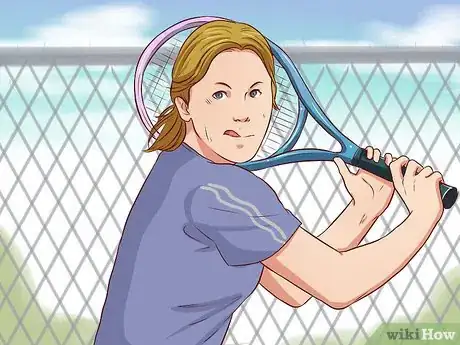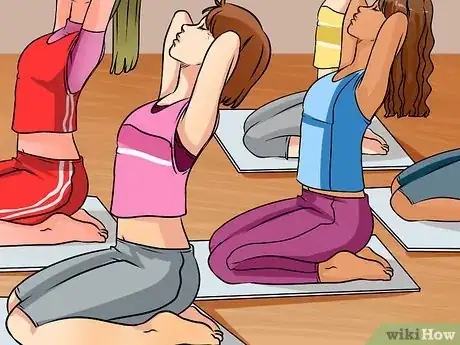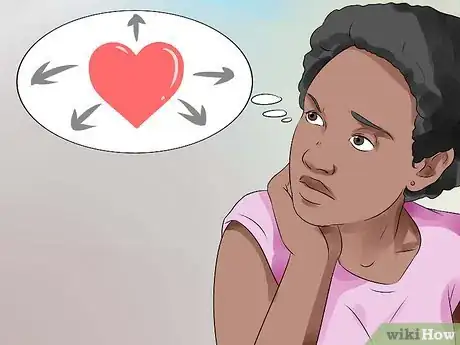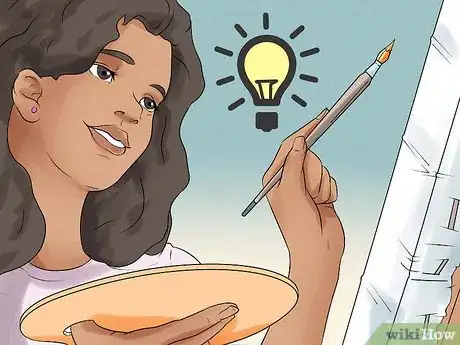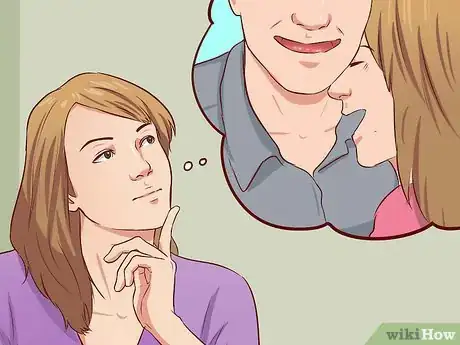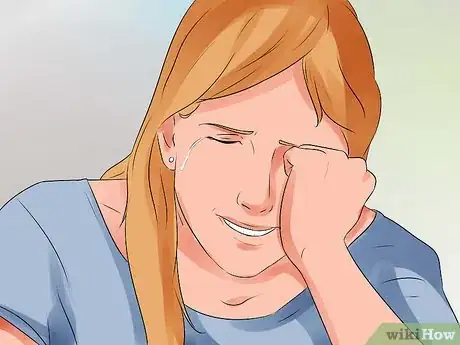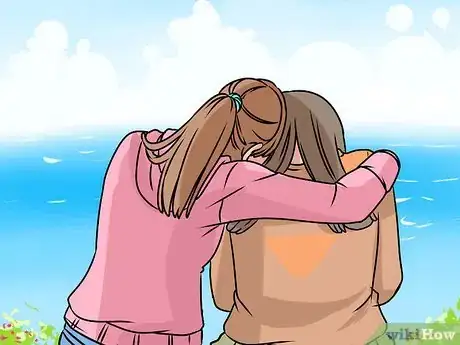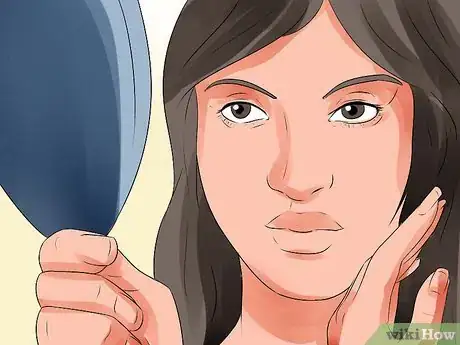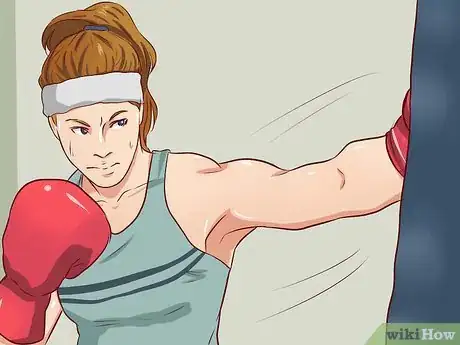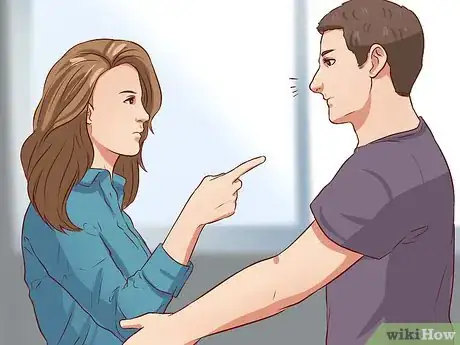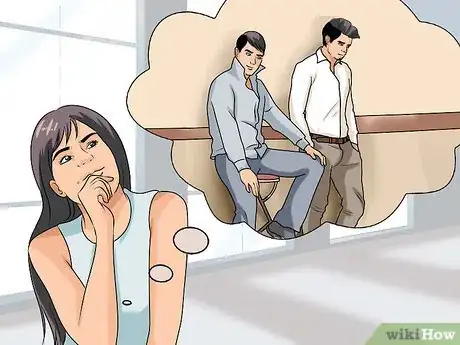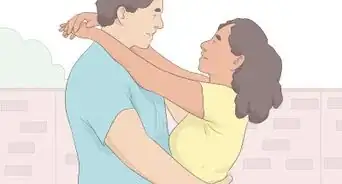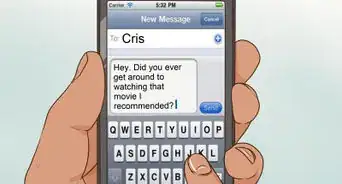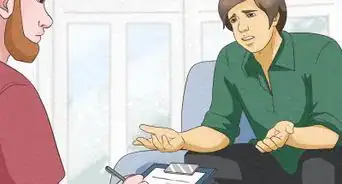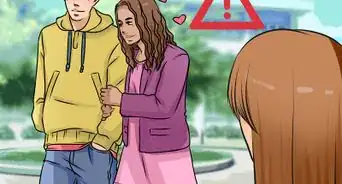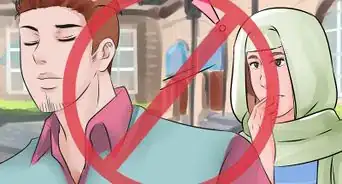This article was co-authored by Tasha Rube, LMSW. Tasha Rube is a Licensed Social Worker based in Kansas City, Kansas. Tasha is affiliated with the Dwight D. Eisenhower VA Medical Center in Leavenworth, Kansas. She received her Masters of Social Work (MSW) from the University of Missouri in 2014.
wikiHow marks an article as reader-approved once it receives enough positive feedback. In this case, several readers have written to tell us that this article was helpful to them, earning it our reader-approved status.
This article has been viewed 345,308 times.
Rejected or unrequited feelings can be painful. If you've had your heartbroken, you likely want a way to get rid of unwanted feelings fast. While you cannot entirely control how you feel, you can take steps to gain perspective and move forward. Try to keep busy in the aftermath in order to keep unwanted thoughts away until you're ready to deal. Once you're ready to face the pain, try to work through your emotions. Acknowledge you feel hurt but try not to take the rejection personally. Eventually, move forward. Cease talking to the guy you like temporarily and seek out support from family and friends.
Steps
Keeping Unwanted Thoughts Away
-
1Keep yourself occupied at all times. When dealing with heartbreak, distraction can help. Look into taking up a new hobby in the aftermath of rejection. Strive to keep busy throughout the day. If you don't keep busy, you're likely to start ruminating and having negative thoughts about yourself and the guy.[1]
- Take up hobbies you enjoy. If you're interested in knitting, start a new knitting project. If you're an outdoorsy type, take up hiking.
- Try to keep busy with a hobby during most of the day when you have downtime. When you're likely to start engaging with troublesome thoughts, find something to do. If you're lying awake at night pondering what went wrong and why, read a book instead or listen to a podcast on your phone.
-
2Join a class. Meeting new people and exploring new activities can also keep your mind occupied. Consider joining a class in and getting involved in your community. Stop by a local community center and see what they offer. Something like, say, a cooking class can help you expand your social circle and make new friends. A new social circle can keep your mind off the guy who rejected you. Eventually, your feelings for him will taper off.Advertisement
-
3Distance yourself from your feelings. You cannot entirely eliminate or control your feelings. However, changing the way you think about your internal feelings can help you gain some distance from them. Try thinking of your feelings as a third party rather than a part of yourself. This can help you gain some distance.[2]
- Think about your feeling as an intrusive third party who continually interrupts your thoughts and emotions. If you're having an otherwise good day, and suddenly unwanted thoughts arise, think to yourself, "Here comes that force again to bother me."
- This can feel awkward at first, but with some practice you'll be able to do it somewhat unconsciously. This can provide you with appropriate distance from your emotions, allowing you to move forward.
-
4Make art out of your feelings of rejection. Heartbreak can be a major inspiration for artistic pursuits. If you're already an artistic person by nature, put your heartbreak into your work. If you've never been particularly artistically inclined before, take your heartbreak as an opportunity to try your hand at something like painting, drawing, or writing.[3]
- Write about unrequited love. If you're a musician, a poet, or some other kind of writer, rejection can make for a great poem, story, or song.
- Paint or draw. Many people, who think in more abstract terms, find painting or drawing out their feelings helps them cope.
- Find whatever art form feels natural to you and let your frustrations and heartbreak act as your muse.
-
5Try dating casually. It may be hard to find a serious relationship when you're healing from loss. However, casual dating can be helpful. Going on a few casual dates can help you feel attractive and wanted again. This may make your feelings of loss less painful.[4]
- Ask your friends to set you up with someone. They may know someone in a similar situations who's looking for light, casual dating.
- You can also try online dating, if you're comfortable. Just make sure you meet any new, romantic partner in a public place before meeting them in private.
- You can also go to a social event alone and try to flirt with a stranger.
Dealing with Your Feelings
-
1Accept the pain. Once you're ready to cope with your feelings, accept that you will be feeling pain. Rejection hurts everyone, and you cannot ignore the pain indefinitely. Spend some time accepting that you're hurt, and coping with negative feeling instead of pushing them down.[5]
- Accept you've been hurt and take care of yourself. Allow yourself time to grieve. Try to be kind to yourself. Give yourself a treat, like a long walk alone or a soothing bath.
- Do not expect too much from yourself too soon. You may feel sad for awhile and down on yourself for awhile. This is all very normal. Do not put too much pressure on yourself to snap out of it. Allow yourself to grieve.
-
2Acknowledge you're not alone. Sometimes, it can help to know other people have been in a similar situation. Most people, at some point in their lives, will have unrequited feelings for another person. Try to remember your situation is common and other people have dealt with it and moved forward.[6]
- It can help to reach out to others. If you know someone who's been hurt in a similar way, talk to him or her.
- Talking to older relatives can also help. Many people, at a younger age, struggled with unrequited romances. Try reaching out to people older than you.
-
3Do not take the rejection personally. It's easier said than done, but you need to take steps not to take rejection personally. Just as you cannot control how you feel, the guy cannot either. A lot of love and attraction comes down to very personal, subjective preferences. Just because you're not right for this one person does not mean you're not right for anyone.
- If you find yourself ruminating over the why of rejection, remind yourself you do not know. You may be inclined to think, "If only I was skinnier/smarter/funnier" but the reality is, you do not know why someone rejected you.
- You should also remind yourself the guy may not know either. Sometimes, you just don't have those kinds of feelings for someone and you do not know why.
-
4Avoid blaming the guy. When searching for reasons why things did not work out, you may be inclined to blame the guy. You may find yourself thinking negative thoughts about him, like, "If he wasn't so shallow, he would have wanted me." However, keep in mind feelings are subjective. Chances are, the guy did not reject you for any particular reason. There are a litany of reasons someone may not be interested in you in a given moment. People do not control feelings. Try to accept that, while the guy is not interested in you, he's ultimately a good person and it's not his fault he lacks romantic interest in you at this time.
Moving Forward After Rejection
-
1Lessen contact with the guy for awhile. It's very hard to get over someone if you see them frequently. As you're trying to stop feeling your feelings, lessen contact with the guy in question.[7]
- How you decide to taper off contact is up to you. You may not need to cut the person out totally, depending on your feelings, but you can make up some guidelines for yourself in terms of how you proceed.
- For example, you can limit yourself to seeing this person once every couple of weeks instead of once a week. You can stop texting this person every day or talking to them on social media for awhile.
-
2Examine past relationship patterns. You may be the type to continually fall for unavailable people. For some, falling for those they cannot have is a pattern of behavior. If you had a childhood where adults were not reliable, you may unconsciously seek out unavailable people as an adult.[8]
- Have you ever been in this situation before? Do you frequently fall for people who are not interested in you? If so, this may be a pattern for you.
- Examine your past. Think about your childhood and whether you felt a sense of security there. If you did not, you may be falling for unavailable people as a defense mechanism to prevent yourself from ever getting close enough to really get hurt.
- If you feel like this is a pattern for you, consider seeing a therapist. A qualified therapist can help you sort through your past and help you make better relationship decisions down the road.
-
3Seek support from others. If you're going through a rough patch, it's important to seek support from others. Talk to friends and family members who care about you. This can help you feel you've loved, wanted, and needed, even if you're not involved with someone romantically in the present moment.
References
- ↑ http://www.huffingtonpost.ca/nicole-forrester/how-to-get-over-someone_b_1419510.html
- ↑ http://everydayfeminism.com/2016/01/dealing-with-unrequited-love/
- ↑ http://everydayfeminism.com/2016/01/dealing-with-unrequited-love/
- ↑ http://www.huffingtonpost.ca/nicole-forrester/how-to-get-over-someone_b_1419510.html
- ↑ https://www.psychologytoday.com/blog/the-couch/201502/6-ways-get-past-the-pain-unrequited-love
- ↑ https://www.psychologytoday.com/blog/the-couch/201502/6-ways-get-past-the-pain-unrequited-love
- ↑ http://everydayfeminism.com/2016/01/dealing-with-unrequited-love/
- ↑ https://www.psychologytoday.com/blog/the-couch/201502/6-ways-get-past-the-pain-unrequited-love
